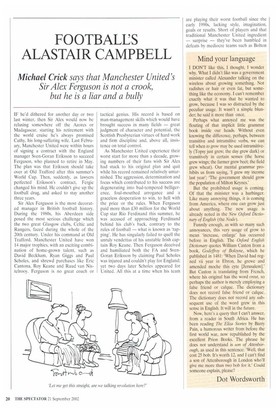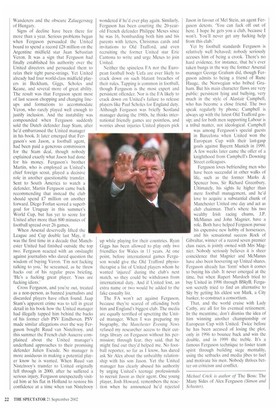FOOTBALLS ALASTAIR CAMPBELL
Michael Crick says that Manchester United's
Sir Alex Ferguson is not a crook, but he is a liar and a bully
IF he'd dithered for another day or two last winter, then Sir Alex would now be relaxing somewhere off the Azores or Madagascar, starting his retirement with the world cruise he's always promised Cathy, his long-suffering wife. Last February, Manchester United were within hours of signing a contract with the England manager Sven-Goran Eriksson to succeed Ferguson, who planned to retire in May. The plan was that Eriksson should take over at Old Trafford after this summer's World Cup. Then, suddenly, as lawyers perfected Eriksson's contract, Fergie changed his mind. He couldn't give up the football drug, and asked to stay another three years.
Sir Alex Ferguson is the most decorated manager in British football history. During the 1980s, his Aberdeen side posed the most serious challenge which the two great Glasgow clubs, Celtic and Rangers, faced during the whole of the 20th century. Under his command at Old Trafford, Manchester United have won 14 major trophies, with an exciting combination of home-grown talent, such as David Beckham. Ryan Giggs and Paul Scholes, and shrewd purchases like Eric Cantona, Roy Keane and Ruud van Nistelrooy. Ferguson is no great coach or tactical genius. His record is based on man-management skills which would have brought success in many fields — great judgment of character and potential, the Scottish Presbyterian virtues of hard work and firm discipline and, above all, insistence on total control.
As Manchester United experience their worst start for more than a decade, growing numbers of their fans wish Sir Alex had stuck to his original plan and quit while his record remained relatively untarnished. The aggression, determination and focus which contributed to his success are degenerating into bad-tempered belligerence, foul-mouthed arrogance and a graceless desperation to win, to hell with the price or the rules. When Ferguson paid more than £30 million for the World Cup star Rio Ferdinand this summer, he was accused of approaching Ferdinand behind his club's back, contrary to the rules of football — what is known as 'tapping'. He has singularly failed to quell the unruly vendettas of his unstable Irish captain Roy Keane, Then Ferguson deceived and humiliated both the FA and SvenGoran Eriksson by claiming Paul Scholes was injured and couldn't play for England; yet two days later Scholes appeared for United. All this at a time when his team are playing their worst football since the early 1990s, lacking style, imagination, goals or results. Short of players and that traditional Manchester United ingredient — surprise — they've been humbled in defeats by mediocre teams such as Bolton Wanderers and the obscure Zalaegerszeg of Hungary.
Signs of decline have been there for more than a year. Serious problems began when Ferguson persuaded the United board to spend a record £28 million on the Argentine midfield star Juan Sebastian Veron. It was a sign that Ferguson had finally established his authority over the United directors and persuaded them to relax their tight purse-strings. Yet United already had four world-class midfield players in Beckham, Giggs, Scholes and Keane. and several more of great ability. The result was that Ferguson spent most of last season chopping and changing lineups and formations to accommodate Veron, who rarely played well enough to justify inclusion. And the instability was compounded when Ferguson suddenly sold the Dutch defender Jaap Stant, after he'd embarrassed the United manager in his book. It later emerged that Ferguson's son Jason, a football agent, had been paid a generous commission for the Stam deal, though nobody explained exactly what Jason had done for his money. Ferguson's brother Martin, who is employed as United's chief foreign scout, played a decisive role in another questionable transfer. Sent to South America to watch a defender, Martin Ferguson came back recommending that instead the club should spend El million on another forward. Diego ForIan scored a superb goal for Uruguay in this summer's World Cup, but has yet to score for United after more than 800 minutes of football spread over 26 games.
When Arsenal deservedly lifted the League and Cup double last May, it was the first time in a decade that Manchester United had finished outside the top two. Ferguson reacted with an onslaught against journalists who dared question the wisdom of buying Veron. 'I'm not fucking talking to you,' he screamed, as he threw hacks out of his regular press briefing. 'He's a fucking great player. Yous are fucking idiots.'
Cross Ferguson, and you're out, treated as a non-person, as banned journalists and discarded players have often found. Jaap Stam's apparent crime was to tell in great detail in his book how the United manager had illegally tapped him behind the backs of his former club PSV Eindhoven. PSV made similar allegations over the way Ferguson bought Ruud van Nistelrooy, and this summer the French club Auxerre complained about the United manager's underhand approaches to their promising defender Julien Escude. No manager is more assiduous in making a potential player know he is wanted. When Ruud van Nistelrooy's transfer to United originally fell through in 2000, after he suffered a serious injury, Ferguson unexpectedly visited him at his flat in Holland to restore his confidence at a time when van Nistelrooy wondered if he'd ever play again. Similarly, Ferguson has been courting the 20-yearold French defender Philippe Mexes since he was 16, bombarding both him and his parents with letters, Christmas cards and invitations to Old Trafford, and even recruiting the former United star Eric Cantona to write and urge Mexes to join United.
Neither the spineless FA nor the European football body Uefa are ever likely to crack down on such blatant breaches of their rules. Tapping is common in football, though Ferguson is the most expert and persistent offender_ Nor is the FA likely to crack down on United's failure to release players like Paul Scholes for England duty. Although Ferguson was briefly Scotland manager during the 1980s, he thinks international friendly games are pointless, and worries about injuries United players pick
up while playing for their countries. Ryan Giggs has been allowed to play only two friendlies for Wales in 11 years. At one point, before international games Ferguson would give the Old Trafford physiotherapist a list of United players whom he wanted 'injured' during the club's next match, so they could be withdrawn from international duty. And if United lost, an extra name or two would be added to the fake casualty list.
The FA won't act against Ferguson, because they're scared of offending both him and England's biggest club, The media are equally terrified of upsetting the United manager. When I was preparing my biography, the Manchester Evening News refused my researcher access to their cuttings library on Ferguson without his permission; through fear, they said, that he might find out they'd helped me. No football reporter, so far as I know, has dared ask Sir Alex about the unhealthy relationship with his son Jason. Yet the United manager has clearly abused his authority by urging United's teenage professionals to recruit Jason as their agent. One young player, Josh Howard, remembers the reaction when he announced he'd rejected
Jason in favour of Mel Stein, an agent Ferguson detests. 'You can fuck off out of here. I hope he gets you a club, because I won't. You'll never get any fucking help from this club.'
Yet by football standards Ferguson is relatively well behaved; nobody seriously accuses him of being a crook. There's no hard evidence, for instance, that he's ever taken bungs in the way the former Arsenal manager George Graham did, though Ferguson admits to being a friend of Rune Hauge, the Norwegian who bribed Graham. But his main character flaws are very public: persistent lying and bullying, very much in the style of Alastair Campbell, who has become a close friend. The two speak regularly by phone; Campbell is always up with the latest Old Trafford gossip; and for both men supporting Labour is a tribal matter, not ideological. Campbell was among Ferguson's special guests in Barcelona when United won the European Cup with their last-gasp goals against Bayern Munich in 1999. A few weeks later came the offer of a knighthood from Campbell's Downing Street colleagues.
Ferguson loves befriending men who have been successful in other walks of life, such as the former Marks & Spencer boss, Sir Richard Greenbury. Ultimately, his sights lie higher than mere football management, and he'd love to acquire a substantial chunk of Manchester United one day and act as club chairman. That's where his two wealthy Irish racing chums, J.P. McManus and John Magnier, have a role. Both have helped Ferguson pursue his expensive new hobby of horseraces, and his sensational success Rock of Gibraltar, winner of a record seven premier class races, is jointly owned with Mrs Magnier. Nobody seriously believes it is sheer coincidence that Magnier and McManus have also been hoovering up United shares. Ferguson already has 'form' when it comes to buying his club. It never emerged at the time, but when Rupert Murdoch tried to buy United in 1998 through BSk-yB, Ferguson secretly tried to find an alternative to Sky by getting his eldest son Mark. a City banker, to construct a consortium.
That, and the world cruise with Lady Cathy, are all for his eventual retirement. In the meantime, don't dismiss the idea of him winning another championship or European Cup with United. Twice before he has been accused of losing the plot, only in 1996 to bounce back and win the double, and in 1999 the treble. It's a famous Ferguson technique to foster team spirit through building siege mentality, using the setbacks and media jibes to fuel and motivate his men. Nobody thrives better on criticism and conflict.
Michael Crick is author of The Boss: The Many Sides of Alex Ferguson (Simon and Schuster).











































































 Previous page
Previous page